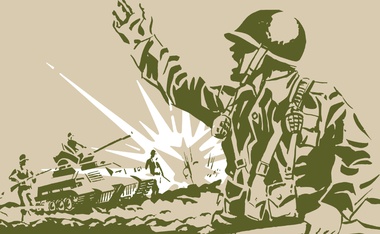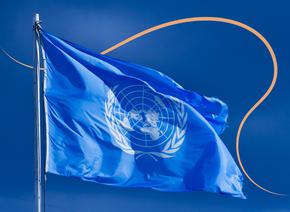The views expressed in our content reflect individual perspectives and do not represent the authoritative views of the Baha'i Faith.
The Russian war in Ukraine has generated many “war crime” and even “genocide” accusations – but legally, what is a war crime? Who commits them? As crimes, how are they prosecuted and punished?
More importantly, what if war itself was a crime, punishable by the entire world?
Understanding the answers to these crucial questions can help everyone develop a new way of thinking about the destructive nature of contemporary warfare – and how to stop it. So let’s look briefly into the history of the concept of war crimes, and see if we can understand how it came about and what it means now.
RELATED: War Crimes – and War As a Crime
What Made War a Criminal Activity?
The First World War shocked humanity. All previous wars had been geographically limited; were fought primarily without technologically-advanced weapons; were limited to troop movements on the ground; and produced nowhere far, far fewer casualties. In WWI, with its brutal trench warfare, more than 15 million people died – by orders of magnitude the largest toll of any modern war in human history until then.
The conscience of the world, stunned by the war’s enormous cost in blood and treasure, impelled many to attempt to implement measures to prevent such carnage from ever happening again. One of those important measures – an international movement to declare war itself a crime against humanity – came originally from a Russian, a Soviet jurist and criminologist named Aron Naumovich Trainin, who began his activism as a young university student working to reform Czarist rule in the failed 1905 Russian Revolution. An editor of the Jewish newspaper New Way and a college professor, Trainin’s impact grew after World War I because of his public castigation of the League of Nations, the world’s initial attempt at an international governmental body, for not doing enough to prosecute nations and the leaders of nations who started wars.
In his 1937 book The Defense of Peace and Criminal Law, Trainin became the first legal scholar to define aggressive war as a criminal offense against humanity itself, and to advocate for an international justice system to punish aggressors.
Trainin was undoubtedly influenced by the iconic Russian novelist and actor Leo Tolstoy, who fought on the Russian side in the Crimean War and, appalled by the needless civilian casualties he witnessed, became a legendary practitioner of pacifism, a sworn opponent of war, and the greatest influence on Mahatma Gandhi’s non-violent activism. No one knows, but perhaps Trainin also felt the influence of the writings of Baha’u’llah, who advised everyone in his Most Holy Book to “Fear God, and join not with the aggressor.” Or maybe Trainin somehow absorbed the Baha’i teachings of Baha’u’llah’s successor Abdu’l-Baha, who defined war as a crime against humanity at the outset of World War I, more than two decades before Trainin did. In this excerpt from a 1914 letter he wrote to the British Baha’i author and actress Beatrice Irwin, Abdu’l-Baha made a clear case for war as a crime:
War saps the foundation of humanity; killing is an unpardonable crime against God, for man is an edifice built by the Hand of the Almighty. Peace is life incarnate; war is death personified. Peace is the divine spirit; war is satanic suggestion. Peace is the light of the world; war is stygian darkness … All the great prophets, ancient philosophers and heavenly Books have been the harbingers of Peace and monitors against war and discord. This is the Divine foundation; this is the Celestial outpouring; this is the basis of all religions of God. …
In brief, the point to make clear is this: His Holiness Baha’u’llah nearly fifty years ago warned the nations against the occurrence of this “Most Great Danger.” Although the evils of war were evident and manifest to the sages and scholars, they are now made clear and plain to all the people. No sane person can at this time deny the fact that war is the most dreadful calamity in the world of humanity, that war destroys the divine foundation, that war is the cause of eternal death, that war is conducive to the destruction of populous, progressive cities, that war is the world-consuming fire, and that war is the most ruinous catastrophe and the most deplorable adversity. …
The results of this crime committed against humanity are worse than whatever I may say and can never be adequately described by pen or by tongue.
Historically, this represents something entirely new. The whole concept of war as a crime against humanity – and of the heinous, immoral violent acts committed during war being labeled as “war crimes” – has only come about within the last two centuries. The idea can be traced back to two seminal 19th century developments: the advent of modern multi-state warfare and the revulsion and resistance it produced; and the advent of the Baha’i Faith, whose founder Baha’u’llah formally warned the world’s kings and rulers, in writing, to disarm, to consult together, and in the words of his successor Abdu’l-Baha, to accept the new Baha’i spiritual law:
A Supreme Tribunal shall be elected by the peoples and governments of every nation, where members from each country and government shall assemble in unity. All disputes shall be brought before this Court, its mission being to prevent war.
It took some time for the influence of these spiritual teachings to work their way into international jurisprudence, but they finally did after World War II and the Holocaust, when the first actual global trial for war criminals took place.
RELATED: Why Soldiers Need a Voice in War
The Nuremberg Trials and the Crime of Aggression
The new concept of war as a criminal activity received its first courtroom test in Nuremberg, Germany soon after the end of World War II, when the International Military Tribunal (IMT) tried 21 surviving Nazi leaders along with six German organizations, including the SS and the Gestapo. (The three leaders of the Nazis – Adolf Hitler, Heinrich Himmler, and Joseph Goebbels – all avoided postwar justice and the Nuremberg trials by committing suicide.)
The IMT charged the defendants with “the crime of aggression”— defined as planning, plotting, and waging aggressive war. The legal definition that underpinned the Nuremberg Trials came directly from Aron Trainin’s work. When the trial concluded, the eventual guilty verdicts against the Nazis declared:
To initiate a war of aggression, therefore, is not only an international crime; it is the supreme international crime differing only from other war crimes in that it contains within itself the accumulated evil of the whole.
This definition concurs with the Universal House of Justice’s message on the subject in its Promise of World Peace statement:
The Universal Declaration of Human Rights, the Convention on the Prevention and Punishment of the Crime of Genocide, and the similar measures concerned with eliminating all forms of discrimination based on race, sex or religious belief; upholding the rights of the child; protecting all persons against being subjected to torture; eradicating hunger and malnutrition; using scientific and technological progress in the interest of peace and the benefit of mankind – all such measures, if courageously enforced and expanded, will advance the day when the spectre of war will have lost its power to dominate international relations.
















Comments
Sign in or create an account
Continue with Googleor